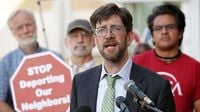In a case that has become emblematic of the fierce debate over U.S. immigration policy, Kilmar Abrego Garcia—an El Salvador native living in Maryland—finds himself at the center of a legal and political storm. After nearly six months of detention, a mistaken deportation, and a harrowing stint in one of Central America’s most notorious prisons, Abrego Garcia was released from federal custody in Tennessee on Friday, August 22, 2025. But his future remains uncertain as he faces the threat of a second deportation, this time to Uganda, and the prospect of criminal prosecution in the United States.
Abrego Garcia’s ordeal began in early 2025 when, according to France 24 and NBC News, he was apprehended by U.S. Immigration and Customs Enforcement (ICE) agents in Baltimore. Despite a 2019 immigration judge’s order protecting him from deportation to El Salvador due to a “well-founded fear” of gang persecution, he was mistakenly expelled to El Salvador in March. There, he was imprisoned in the infamous CECOT mega-prison, a facility notorious for reports of beatings, torture, and sexual abuse among detainees—many of whom have never seen trial. Abrego Garcia later claimed in court filings that he was beaten and psychologically tortured during his time in CECOT, though El Salvador’s President Nayib Bukele denied these allegations.
After a Supreme Court order and mounting public outcry, the Trump administration returned Abrego Garcia to the United States in June 2025. However, his freedom was short-lived. He was immediately detained again, this time on federal human smuggling charges stemming from a 2022 traffic stop in Tennessee where he was found driving with nine passengers. Abrego Garcia pleaded not guilty, and his attorneys have since filed motions arguing the prosecution is both “vindictive” and “selective.”
As detailed by The Associated Press, U.S. Magistrate Judge Barbara Holmes ruled in June that Abrego Garcia had the right to be released while awaiting trial. Yet, due to fears that ICE would immediately deport him, he remained in a Tennessee jail for eleven more weeks at his lawyers’ request. It was only after U.S. District Judge Paula Xinis issued an order barring ICE from detaining him upon release—and requiring that any removal proceedings begin in Baltimore with at least three business days’ notice—that Abrego Garcia was finally freed.
Upon his release, Abrego Garcia was reunited with his wife, Jennifer Vasquez Sura, and their three children in Prince George’s County, Maryland. “We are steps closer to justice, but justice has not been fully served,” he said in a statement on Friday, reflecting both relief and lingering anxiety about what comes next.
Yet, the legal and political maneuvering continued almost immediately. Minutes after his release, ICE notified Abrego Garcia that he was to report to an immigration facility in Baltimore on Monday, August 25, 2025, and that he could be deported again—this time to Uganda. The Trump administration also presented him with a plea deal: plead guilty to the federal charges, serve a sentence, and then be deported to Costa Rica, where the government has guaranteed him protection. If he does not accept the offer by Monday, the deal will expire, leaving Uganda as the likely destination.
According to NBC News, Abrego Garcia’s attorneys have called the government’s actions “punishing” and “preposterous.” Simon Sandoval-Moshenberg, one of his lawyers, stated outside Abrego’s brother’s home, “It is preposterous that they would send him to Africa, to a country where he doesn’t even speak the language, a country with documented human rights violations, when there are so many other options. This family has suffered enough.” Sandoval-Moshenberg also emphasized their intention to “fight tooth and nail” against deportation to Uganda or any other distant country, arguing that Costa Rica is a far more reasonable option: “Costa Rica makes sense. It’s a Spanish-speaking country. It’s proximate to the United States. His family can visit him there easily.”
For Abrego Garcia, the Monday ICE check-in in Baltimore is a pivotal moment. Under the conditions of his pre-trial release, he must wear an ankle monitor with GPS tracking, remain in the custody of his brother, and attend an anger management program. He is also barred from contacting known MS-13 members, possessing firearms, or using alcohol excessively. His trial on human smuggling charges is scheduled for January 2026 in Nashville, but if he is deported before then, he may never have the chance to defend himself in court.
The case has drawn support from local leaders and immigrant rights organizations. Maryland Governor Wes Moore, speaking on Face the Nation, insisted, “Absolutely, I want due process. I just simply want a court and a judge to decide what is going to be the future fate of this case and all cases like this, and not simply the President of the United States or the Secretary of Homeland Security, who is trying to be judge, juror, prosecutor, and executioner inside this case. I believe in the Constitution, and I believe that that’s what we should follow for this case.” Governor Moore also criticized the Trump administration for exploiting what he called a “broken immigration system” instead of working with Congress to fix it.
Maryland Senator Chris Van Hollen echoed these sentiments, saying, “I was glad to have the opportunity to speak with Kilmar Ábrego García this morning and welcome him back to Maryland after what has been a long and torturous nightmare.” The senator accused the administration of a “malicious abuse of power” and reaffirmed his commitment to fighting for Abrego Garcia’s constitutional rights.
Meanwhile, CASA, a leading immigrant rights organization, has organized a rally and prayer vigil at Hopkins Plaza in Baltimore, set for the morning of Abrego Garcia’s ICE check-in. Jossie Sapunar, CASA’s communications director, urged the community to “stand up and protect our immigrant neighbors because right now, it’s a moment of attack.”
As the clock ticks toward Monday, the fate of Kilmar Abrego Garcia remains uncertain—caught between the machinery of U.S. immigration enforcement, the demands of due process, and the hopes of a family and community who refuse to give up on justice. The coming days will reveal whether the courts, the administration, or public advocacy will ultimately decide his future.



